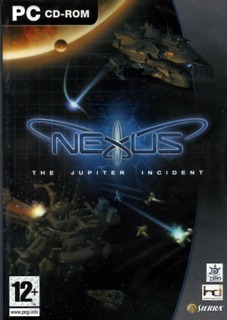Nexus, The Jupiter Incident is a good game that has a lot going for it, but it's not without its shortcomings.
The basic story of the game is that you play the role of Marcus Cromwell, a war hero that had gone missing for some ten years before being recovered from hibernation in orbit around Mars. Your family has a proud history of space exploration and combat, and your father disappeared trying to pass through a wormhole with a colonization fleet. You start the game working for one of the handful of megacorporations that basically run space travel in the solar system.
Things progress fairly quickly, and that is one of the strengths of the game. You start out with an unimpressive cruiser, but soon discover alien technology and a much cooler ship with lots of neat abilities, which you control most of the game. You also pick up more support ships as the game progresses, and more and greater powers with your primary vessel.
The gameplay is pretty good, but not great. Often, it feels like you're just along for the ride while things just happen. If you don't have the best assortment of weaponry (and trust me, there are a lot of options), battles can take forever to complete. Of course, you can always restart missions, but this entails reconfiguring your weapon and device load-outs. Luckily, this is a mostly smooth process, although I did find one thing that bothered me. Most ships come with somewhere between a dozen and perhaps thirty hardpoints where all manner of weapons, engines, shields, and miscellaneous devices can be attached. However, each hardpoint slot can only be used for certain types of devices or weapons. The problem stems from the fact that some slots can be used for more than one type of item.
So, let's say you're going on a recon mission. You'll want to take that multi-use light weapon/scanner slot and put a data scanner into it. But if you've already got a light weapon in that slot, you can't move it to another dedicated light weapon slot. You have to get rid of it completely, and you get no credit for having it. It just disappears. This is mildly frustrating, but you generally have enough resource points that you can pretty much get what you'll want or need to complete a mission.
The battles themselves are pretty fun, but like I said, it doesn't always feel like you have that many options. It's pretty much attack an enemy's shields, knock them out, attack their hull, rinse, repeat. There are a variety of situations you'll encounter, however, such that you're not always in a straight-up combat situation. This keeps things from getting too repetitive or dull.
Of course, one of the great things about this game is the fact that even when you're just watching battles unfold, you'll be pleased, because the game looks pretty great. The weapons all have distinctive looks and effects, and when lots of stuff is happening simultaneously, things can get exciting. Also, the sound effects are top notch, with a number of really odd sound effects for the weapons, and also for the other bizarre occurrences you'll encounter while travelling the galaxy.
Speaking of sound, the voice acting is surprisingly good. There is a lot of spoken dialogue between and during missions, and thankfully, the actors are almost universally perfectly cast. I never found myself wishing they would shut up. The variety of characters and their interactions create a pretty good dramatic backdrop for the action. The only voices that seemed a little excessive and over the top were one of the more violent alien races, but only just barely. Otherwise, the sound was generally awesome.
The game probably has limited replay value, since it's primarily one large campaign, and half the fun is watching the plot unfold, although skirmishes could be entertaining, in theory. The only issue is that, without a storyline to carry you along, battles might be a lot less compelling.
Overall, Nexus: The Jupiter Incident is a really cool game. I particularly enjoy the fact that it's set just a century in the future, and begins by showing how mankind has made progress with space exploration, but maintains realism, evinced by the fact that you initial journey from Mars to Jupiter takes approximately eight months. As new technologies and more advanced alien races are encountered, however, the technology level jumps significantly. It all feels like a natural progression, of course allowing for the sci-fi elements and the fact that you must suspend disbelief.
Despite its minor flaws, I would recommend this game to anyone who's ever enjoyed any of the Wing Commander games, or Freelancer, or even space RTS games like Homeworld or Star Wars: Empire at War. It's somewhere in the middle, with a little for everyone.

